Rabbits might be quiet, but they're full of personality – if you know what to look for. Here’s how to decode your rabbit’s body language.
Rabbits are extremely expressive and display their emotions in pronounced ways – but because they don’t bark, meow or make many verbal noises, it can be difficult to understand what your rabbits are trying to say.
Decoding rabbit body language
As prey animals, rabbits might be quieter than some other pets. But by taking the time to watch your rabbits’ behaviour, it’s possible to decode their body language and discover more about how they’re feeling.
Pay attention to your rabbits’ ears
Your rabbits’ ears can give plenty of clues to their general mood. Here’s what to look out for:
- Both ears up with the insides facing forward: happy and sociable
- Both ears back, combined with a stiff body posture: anxiety or concern
- Both ears up with the insides facing backward: leave me alone
How can I tell if my rabbits are happy?
If your rabbits live in a pair or more, have plenty of space to move around and can express their natural behaviours, you’ll probably notice some of the following behaviours.
Nose twitching
Happy rabbits tend to twitch their noses almost constantly, whether they’re jumping for joy, taking a nap or eating their favourite treats.
Jumping in the air (‘the binky’)
It can be a bit disconcerting the first time you see your rabbit doing a ‘binky’, but this expressive movement is the ultimate sign of happiness. A binky is slightly different from hopping, the usual way rabbits move around. A binky is a high jump, usually combined with twisting in the air, ear flicking and head flipping. Often, this move is accompanied by high-speed running.
Some rabbits binky a lot, while others might not binky much at all. Others may do a mini version of a binky, by lifting their head and front legs but leaving their back legs on the ground.
Chin rubbing
Rabbits have scent glands under their chins, so rub on things as a way of marking their territory. You might notice your rabbits rubbing their chins on objects in the house or in their run, especially anything new.
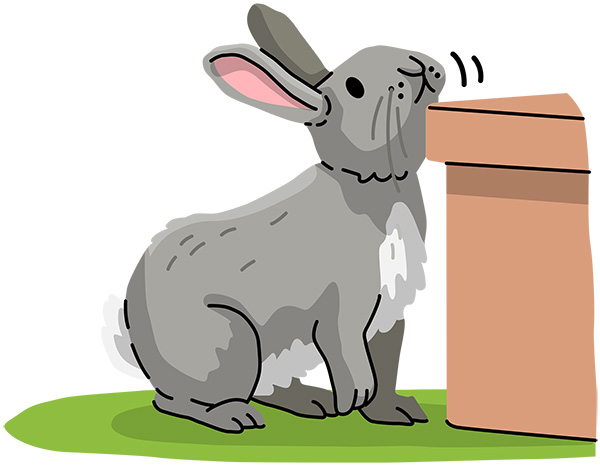
Chewing
Whether it’s a stick, the side of their enclosure or your skirting boards, rabbits love to chew! This isn’t them being destructive, but simply a way to keep their teeth from overgrowing.
Chewing is a natural activity for rabbits, so be sure to offer your bunnies plenty of things to chew on. Just keep them away from wires!
The bunny flop
When your rabbit flops on their side for a rest, it’s a good sign they feel content. The first few times you see this behaviour can be a bit alarming – as most rabbits flop down extremely quickly,
Lying down
If your rabbits are lying down, they’re probably feeling at ease. Rabbits lie down in a wide range of positions, from tucking their legs under their bodies, to lying with their front paws pointing forward and rear legs sticking out sideways, to fully extending their bodies and stretching their legs out.
Circling
If your rabbits run around your legs, they’re showing excitement and affection. Sometimes they’ll also run between your legs in a figure-of-eight pattern. At the same time, some rabbits will make a quiet honking sound. Sometimes, this sound indicates excitement but it’s also a mating behaviour seen in unneutered male rabbits.
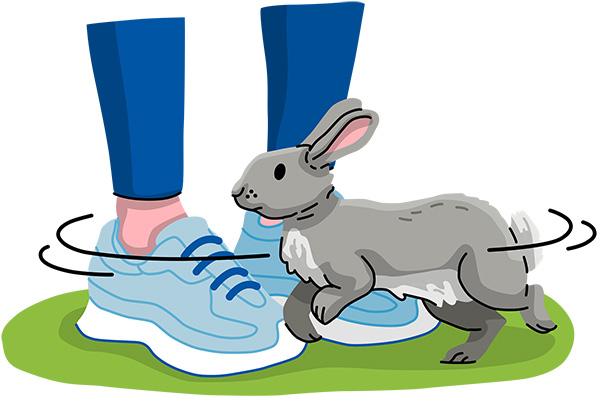
Butt twitching
Sometimes, rabbits will twitch their tails when eating a particularly tasty treat. It’s a relatively unusual behaviour, but shows your rabbit is happy and enjoying whatever they’re eating.
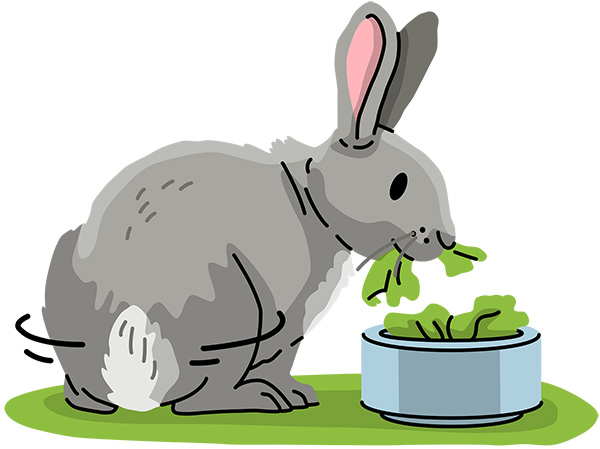
How can I tell if my rabbits are unhappy?
Anxiety, illness or a change in the dynamics of a bonded pair of rabbits can all cause rabbits to feel unhappy. Because rabbits respond to stress and threats in different ways, it’s important to know what’s normal for your rabbits and to keep an eye on whether that changes.
Watch out for the following signs of unhappy rabbit body language, and remember that rabbits are very good at hiding any issues, so any changes may be subtle to start with. If you’re concerned, it’s always best to speak to your vet.
Boxing
When your rabbits sit up on their back legs and raise their front paws in a ‘boxing’ motion, they’re trying to look larger and more threatening. This is generally aggressive behaviour, shown when your rabbit can’t run and hide away. A boxing rabbit’s ears will usually be pointed up and facing out. They may also bare their teeth and growl.
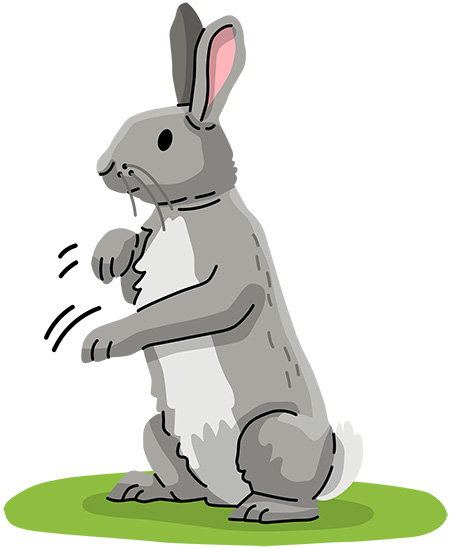
Thumping
Why do rabbits thump? Wild rabbits stamp or thump their hind legs on the ground to communicate a threat or danger to each other – and domestic rabbits do the same. If your rabbit thumps their back legs, it usually means they’ve seen or heard something they perceive as dangerous. Sometimes it can also be used to signal displeasure.
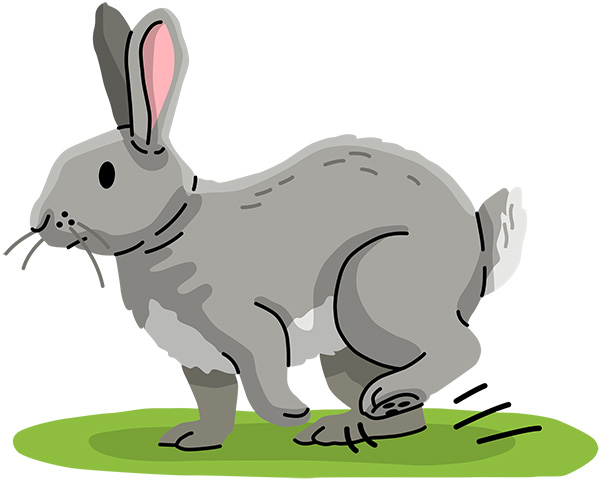
Kicking
Rabbits typically kick or scratch when scared or frustrated, but it can also indicate pain. Make sure you’re getting regular checkups with your vet to ensure your rabbit isn’t unwell or in pain. If you have rabbit insurance with Petplan, use our Pet Expert Chat feature to speak with an expert, 24/7. Log in to your My Petplan account and go to the MySupport area to access advice,
Crouching
Rabbits tend to crouch down with tense muscles when they’re feeling anxious or stressed. This position makes them as inconspicuous as possible, while also meaning they’re ready to spring away if necessary. When crouched, your rabbit’s head will be flat to the ground, and their ears wide apart. Their pupils will often be dilated, too.
Hiding
When rabbits feel anxious, they’ll often hide. In this case, don’t lift your bunnies out of their safe spot, as this can make them feel threatened and even more anxious. Instead, give them space to come out in their own time. Make sure they have plenty of fresh food and stimulating toys in their hutch to help entice them to come out and explore.
If your rabbits are hiding away for long periods, ask your vet to check them over for signs of illness or pain.
What sound does a rabbit make?
Rabbits aren’t very vocal, but the sounds they do make can indicate their mood.
When rabbits feel threatened, angry or want to show disapproval, they may give a little grunt. If they’re experiencing discomfort or pain, they may grind their teeth – although this can also be a sign of contentment.
If your rabbit screams, they’re in severe pain or fear, and need immediate attention.
Do rabbits smell?
Rabbit urine has a distinct odour, and rabbits often spray urine around to mark their territory. This spraying is different to inappropriate urination, which is more likely to occur on horizontal surfaces and needs veterinary attention. Rabbits usually spray urine on vertical surfaces, but getting them neutered can reduce the chances of this behaviour.
The impact of fertility and hormones on rabbit body language
Rabbit behaviour can be impacted by hormones. If your unneutered male rabbit suddenly becomes aggressive, he may be trying to protect his territory. If an unspayed female rabbit is eating more than usual, seems reluctant to be handled or is creating a nest – she’s probably pregnant!
Aggressive behaviour is more common in rabbits that haven’t been neutered, and 80% of unneutered female rabbits have reproductive complications at some point. It’s always best to neuter your rabbits so they can live happily together.
Have you decoded your rabbits’ body language? Share what you’ve discovered on Petplan’s Facebook page
